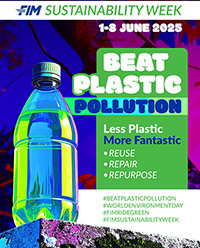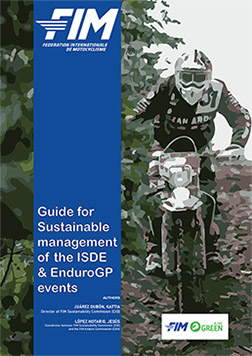
The International Sustainability Commission (CID)
The FIM is committed to caring for the environment and created its International Sustainability Commission (CID) to enforce this policy. The adoption of the first FIM Environmental Code dates back to 1994. This document, whose latest version was adopted at the end of 2009, is updated every year by the CID and is an essential tool for national affiliated federations and other organisers of FIM events.
This Code prescribes regulations and recommendations to improve the relationship between motorcycling and the environment and promotes sustainable events.
These regulations and recommendations refer in particular to:
1) noise, fuel, protection of the ground and cleaning issues
2) behaviour and activities of the spectators, organisers, circuit/track managers, race participants and road users
3) duties for CID Delegates and Environmental Stewards
The International Sustainability Commission (CID)
It shall deal with all matters relating to environmental protection and shall establish close co-operation with all sporting and extra-sporting Commissions as well as with the Panels. It shall advise the BD on all steps which it feels ought to be taken in this area.
Sustainability Policy
Statement
The FIM (Fédération Internationale de Motocylisme) is the world governing body for motorcycling sport and the global advocate for motorcycling.
We believe that sport should act as a role model and serve as a showcase to promote values and good practices, representing a significant contribution to the development of education, social cohesion, health and wellbeing and sustainable development. The practice of motorcycling as a means of transport or recreation continues to increase and should, therefore, be considered a contributor to achieving the Sustainable Development Goals.
The FIM is committed to developing and promoting a sustainability programme to enhance its positive impact on the environment and society and reduce any possible adverse effects.
The FIM´s goal is to establish a culture of sustainability in motorcycle sport worldwide.
In order to achieve this, we will:
Continue to foster an Environmental Protection Programme.
Comply with all relevant legislations, regulations, policies, local laws and site agreements designed to protect the environment.
Monitor advances in technology and environmental best management practices and apply them as appropriate.
Continue developing Environmental Regulations and Guidelines and seek improved options aiming to reduce the potential for adverse environmental impacts concerning
Sound emissions
Soil and groundwater contamination
Emission into the air
Protection of biodiversity
Protection and promotion of cultural heritage
The FIM is committed to supporting and promoting alternative energies, organising and supporting the use of two-wheeled vehicles powered either by electricity or other sustainable sources of energy, and also looks for the best options in product life cycles by promoting a circular economy.
Through this sustainable policy and the points described above, the FIM seeks to contribute to achieving the Sustainable Development Goals.
All employees, Officials (voluntary/paid), competitors, associated competition participants, non-competitive participants and others, involved in any capacity in motorcycle sport conducted under the aegis of the FIM, are strongly invited to comply with the FIM’s Sustainability Policy.
Jorge Viegas, President,
Fédération Internationale de Motocyclisme
February 2020
Environmental Code
he FIM Environmental Code is a constantly evolving document, updated every year by the CID’s working group and approved by the Board of Directors at the end of the year. All updates are based on observations made by Environmental Stewards during competitions. These officials are appointed by the host national federations and their job is to ensure that the Code is complied with at every event. Using checklists, the Stewards report any anomalies that occur during the competition to the clerk of the course, and afterwards they send a copy to the CID. Through these observations, the group keeps abreast of what is happening in the field. The Commission members themselves also conduct supervisory activities.
The constant evolution of the Code, based on a policy of continual improvement, means that the events are run with effective regulations that reflect the latest thinking. Over time, the Code has been brought in line with part of the United Nations’ Sustainable Development Development Goals that focus on sustainable development, and it contains articles that relate to the fight against climate change, biodiversity, gender equality amongst others. The most recent editions of the Code include articles that support the circular economy, biodiversity, energy and the recycling of waste.
Environmental Code as a Glance
- First created in 1992
- First working group met in Geneva in 1993
- The priorities of the first Code were: protecting the ground and groundwater and reducing noise levels
- Later, the Code integrated some of the Millennium Development Goals and Recently the sustainable development Goals
- Today, Environmental Stewards at each event use a checklist to ensure that the Code is being followed
- The Code is updated every year
- In 2020 the Code was reorganised and new regulations including biodiversity conservation and promoting was integrated to the code
- In 2020 the chapter Fuel was changed by a chapte named Energy
Appendix C
For each FIM Championship, Prize event or classic gathering, the FMNR must appoint an Environmental Steward who shall deal only with environmental aspects and who must have successfully completed a seminar organised by the FIM International Sustainability Commission (hereafter CID).
Duties of the Environmental Steward:
a) Ensure that the FIM Environmental Code is respected.
b) Have access to all information concerning the event, and must be able to give prior to, during and after the event, recommendations to the Organiser and the President of the Jury or Chief Steward on all aspects of the event related to sustainability.
c) Participate jointly with the organiser to elaborate the Environmental Management Plan and Environmental Management Map and send to the corresponding Sporting Commission coordination the mentioned plan as described in Articles 5.1 and 5.2 of this Code.
d) Draw up a report on the basis of a check-list prepared by the International Sustainability Commission and send it within 48 hours to the FIM Administration (cid@fim.ch). A copy must also be handed to the Jury President or Chief Steward, Coordinator of the commission and the FIM Environmental Delegate if present at the event. In case of a first non-respect of this point, the Environmental Steward will receive a warning from the FIM through his FMN. In case of a second offence, the FIM may pronounce against the Environmental Steward a suspension of the licence of up to 12 months. The FIM will also send a warning to the Steward’s FMN.
e) Instruct officials during national seminars for the various disciplines.
f) Have the right to attend all open meetings of the International Jury, but without voting rights.
g) In case of non-respect or violation of the provisions contained in the FIM Environmental Code, the Environmental Steward must immediately fill in the Environment Official Incident Form (Appendix C) and hand it to the Clerk of the Course and the Official Secretary of the event with confirmation in writing, providing details of the infringement.
Jerez Declaration
JOINT DECLARATION OF COMMITMENT TO ENVIRONMENTAL SUSTAINABILITY
AND THE ADVANCEMENT OF WOMEN
We, the Fédération Internationale de Motocyclisme (FIM), during the Women and Sustainability Conference that took place on 19 and 20 November two thousand and fifteen, by means of the present declaration and
CONSIDERING the sustainability policy that the International Motorcycling Federation signed in the person of its President Vito Ippolito in 2012, setting out the FIM’s commitment to sustainable development;
CONSIDERING the Environmental Code ratified by the FIM General Assembly in 1995 during the Congress held in Karlstad, Sweden, which came into force on 1 January 1996 and applies to all events organised under the FIM’s jurisdiction;
CONSIDERING the Memorandum of Understanding signed by the FIM and the United Nations Environment Programme (UNEP) in the year 2006 and recently ratified in 2015;
CONSIDERING the Advancing Women Programme presented by the FIM Women in Motorcycling Commission (CFM) in February 2014;
CONSIDERING the Brighton Declaration on Women and Sport, signed by the FIM in 2006 in the interests of equality, development and peace;
RECOGNISING that sport represents a significant contribution to the development of education, social cohesion, health and wellbeing and sustainable development;
RECOGNISING that sport represents the highest values and that it cultivates high-level athletes who represent that ideal;
RECOGNISING that the practice of motorcycling, as a means of transport or recreation, continues to increase and that it should therefore be considered from an environmental point of view;
RECOGNISING the important role played by sport in society and its pursuit of equality between men and women;
RECOGNISING the right of men and women to practise sport in a healthy and clean environment;
RECOGNISING that motorcycling is one of the most largest constituents of national and international sports calendars, attracting a growing audience that produces significant economic impacts and that, like any other human activity, sports events generate positive and negative impacts and that they bring about an increase in the cohesion of our society, stimulate the economy and raise awareness of environmental issues;
RECOGNISING the principles of equity and equality in society and in sport;
EMPHASISING
- that every person has the right and should have the opportunity to take part in sport that is safe, inclusive and clean and that preserves the rights, dignity and respect of the individual;
- that every person has a right to enjoy nature while, at the same time, respecting its value to humanity;
- the importance of including women in sports events and especially those that have traditionally been considered predominantly for men;
- women’s potential, knowledge, experiences and values with which they can contribute towards the sustainable development of sport;
- the importance of women’s participation in leadership, administrative, technical and sporting roles;
- that education is one of the fundamental pillars of sustainability;
- that applying the principles of sustainability will guarantee and vouchsafe the practice of sport for future generations;
hereby declare our commitment to:
- Set up and maintaining a programme of environmental sustainability, awareness, understanding and appreciation.
- Comply with the legislation, regulations, policies, laws and local agreements designed to protect the environment.
- Monitor and evaluate technological advances and good environmental practices and applying them as appropriate.
- Pursue constant improvement and re-evaluation, especially with programmes that foster the environmental education of our competitors, organisers, promoters, officials, staff, and environmental ambassadors through the Ride Green programme.
- Respect and value our volunteers.
- Foster female participation in all spheres: administrative, sporting and technical
- Foster a sport that is inclusive and respectful
- Continue improving and adapting our environmental regulations, through the FIM Environmental Code, to ensure that it is enforced.
- Use sport and its values as a vehicle to inspire the great sports family
- Develop tools and structures to foster the dissemination and sharing within the motorcycling world and among all its stakeholders of best practices with regard to the sustainability of major international sports events held under the FIM’s jurisdiction
- Further exchanges of expertise about sustainability within the FIM family.
- Do what is in our power to ensure that our natural environment is be protected from any form of negligence, exploitations or any practice which may cause its degradation.
Vito Ippolito - FIM President,
Ignacio Verneda - FIM CEO,
Kattia Juárez Hernández - FIM Sustainability Commission (CID) Director,
Nita Korhonen - FIM Women in Motorcycling Commission (CFM) Director
November 2015
Winners of the FIM Environmental Trophies
| American Motocyclist Association | AMA | 1997 |
| Dr Jacque Rogge | CEO | 1998 |
| Circuit of Nuerburgring | GER | 1999 |
| Danmarks Motor Union | DMU | 2000 |
| MC Carnico, Tolmezzo, Udine | ITA | 2001 |
| Northland Motorcycle Riders Association | USA | 2002 |
| Phakisa Freeway | RSA | 2003 |
| Confederaçao Brasileira de Motoclismo | CBM | 2004 |
| MSC Zschopau | GER | 2005 |
| Auto-Moto Club dz Sanetsch | SUI | 2006 |
| Moto-Ckub Angérien | FRA | 2007 |
| Auto Moto Club de Serres | GRE | 2008 |
| Canastra Team | BRA | 2009 |
| Team Betti Moto | ITA | 2010 |
| Motorcycling Australia | MA | 2011 |
| Circuits de Catalunya | ESP | 2012 |
| Federacio Motociclista d'Andorra | FMA | 2013 |
| Circuit Of The Americas, Austin, Texas, & Yamaha Motor Co, Lesmo, Italy | 2014 | |
| Federació Motociclista d’Andorra | FMA | 2015 |
| Circuit de Barcelona Catalunya | ESP | 2016 |
| MSC Greuenbroich | GER | 2017 |
| Sky Ocean Rescue - Un Mare da Salvare | ITA | 2018 |
| Circuit de Barcelona Catalunya | ESP | 2019 |
| Federazione Motociclistica Italiana “A fast race towards sustainibility” | ITA | 2021 |
| Escuderia Castelo Branc | POR | 2022 |
| Misano Green Circuit: The sustainability of events | ITA | 2023 |
| Prime Stadium – Promoter of the FIM EnduroGP World Championship | POR | 2024 |
Environmental Honourable Mention
| EWC Sustainability Programme | Discovery Sports Events | 2022 |



